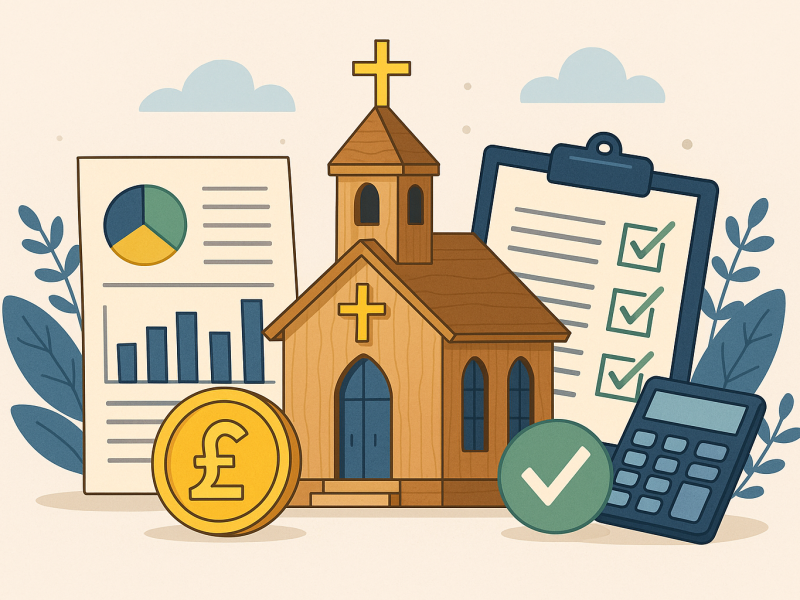
Faith-based organisations play a vital role in communities — offering spiritual guidance, social outreach, education, humanitarian support. Behind the scenes however, these organisations (including churches) face complex financial and regulatory responsibilities. From charity accounting through payroll and tax compliance, staying transparent and compliant is essential to maintaining public trust and fulfilling legal obligations.
Understanding Legal and Financial Structures
In the UK, many faith-based organisations (including churches) operate as charities. That means they must operate for charitable purposes only and follow the rules under charity law.
Depending on their setup, they may fall into one of these categories:
- Registered charities – must register with the Charity Commission for England and Wales (“Charity Commission”) and file annual returns. LINK
- Excepted charities – some church and faith groups may fall under this category.
- Charitable Incorporated Organisations (CIOs) or companies limited by guarantee – also must submit accounts to the Charity Commission and, if a company, to Companies House. LINK
Even though many faith-based charities (including churches) are exempt from Corporation Tax on qualifying activities, they are still accountable for how they manage, record and report their finances.
2. Annual Reporting and Charity Commission Compliance
All registered faith-based charities (including churches) must prepare and submit:
- Annual accounts
- A trustees’ report (or equivalent)
- An Annual Return to the Charity Commission LINK
The format and audit/examination requirement depend on income and structure: - Organisations with income under a threshold (e.g., under £10,000) only need to complete a simple online return.
- Income above defined thresholds (e.g., £25,000 or more) require independent examination or audit.
- Returns must be submitted within 10 months from the end of the financial year.
For example: if a church’s year-end is 31 March 2025, the deadline for the annual return would be 31 January 2026.
Clear records help demonstrate stewardship to donors, congregants, communities and regulators.
3. Gift Aid and HMRC Registration
Many faith-based organisations (especially churches) rely heavily on donations. By registering with HM Revenue & Customs (“HMRC”) for charities, they can claim Gift Aid, which allows them to reclaim extra tax on eligible donations (increasing donation value by about 25 %). LINK
Key points to get right:
- The donor must be a UK taxpayer and must have made a valid Gift Aid declaration.
- Claims must be made within four years of the end of the accounting period in which the donation was received.
- Faith organisations must keep accurate donor records and declarations (e.g., name, address, date, donation amount).
If mismanaged, incorrect Gift Aid claims can lead to penalties, reclaimed funds, or compliance risks.
4. Payroll, Pensions, and Employment Compliance
If a faith-based organisation (including a church) employs staff — for example clergy, administrators, caretakers, musicians — they must handle:
- PAYE (Pay As You Earn) with Real Time Information (RTI) submissions to HMRC
- National Insurance contributions
- Workplace pension auto-enrolment
- Employment law obligations, record-keeping, payroll documentation
Even part-time or casual workers may trigger obligations, and failure to comply may lead to regulatory risk and tax exposure.
5. VAT and Property/Building Projects
While many religious charitable activities are VAT-exempt or zero-rated, some income-generating activities (e.g., renting halls, cafés, shops affiliated with a place of worship) may require VAT registration if the taxable turnover exceeds the threshold (currently ~£90,000 in 2025).
Also, building or refurbishment projects associated with places of worship often involve complicated VAT rules (reduced or zero-rates may apply under certain conditions). Without expert advice, faith-based organisations risk missed reliefs or over-payment of VAT.
6. Common Bookkeeping and Financial Challenges for Faith-Based Organisations
- Heavy reliance on volunteers (treasurers, trustees) with limited accounting experience
- Manual or inconsistent bookkeeping and record-keeping
- Distinguishing between restricted funds (e.g., building funds, mission funds) and unrestricted funds (general donations)
- Proper documentation of Gift Aid donor declarations
- Maintaining transparency in reporting to congregants/members
- Keeping pace with regulatory changes and digital accounting best practice
- Overseeing building projects, renting activities, trading subsidiaries, which add financial complexity
- The specialist nature of “church accounting” or “faith-based organisation accounting” means standard charity financial protocols may need adapting. ICAEW
Poor accounting or failure to report can damage credibility, invite regulatory scrutiny, or jeopardise charitable status.
7. How Experts on CheckTheBooks Can Help
Financial transparency doesn’t happen by accident — it’s built through proper systems, discipline, and professional oversight. That’s where verified professionals on CheckTheBooks come in.
Faith-based organisations (including churches, mosques, synagogues, temples) can connect with qualified accountants, bookkeepers, and charity-finance specialists who understand the unique responsibilities of religious institutions.
These professionals can help with:
- Setting up and managing charity-compliant bookkeeping systems, tailored to faith organisations
- Preparing and filing Annual Returns, accounts and trustees’ reports with the Charity Commission or relevant regulator
- Handling Gift Aid registration, claims and donor record-keeping
- Managing payroll, pensions and employment compliance for staff in faith organisations
- Advising on VAT and building/property project finances specific to places of worship
By hiring via CheckTheBooks: - You can post your specific financial task (e.g., “Prepare annual accounts for my church/faith group”)
- Receive transparent quotes from multiple verified professionals
- Pay securely via Escrow, giving peace of mind and accountability
This support lets faith-based organisations focus on mission and community work, while qualified experts ensure the financial side is in order.